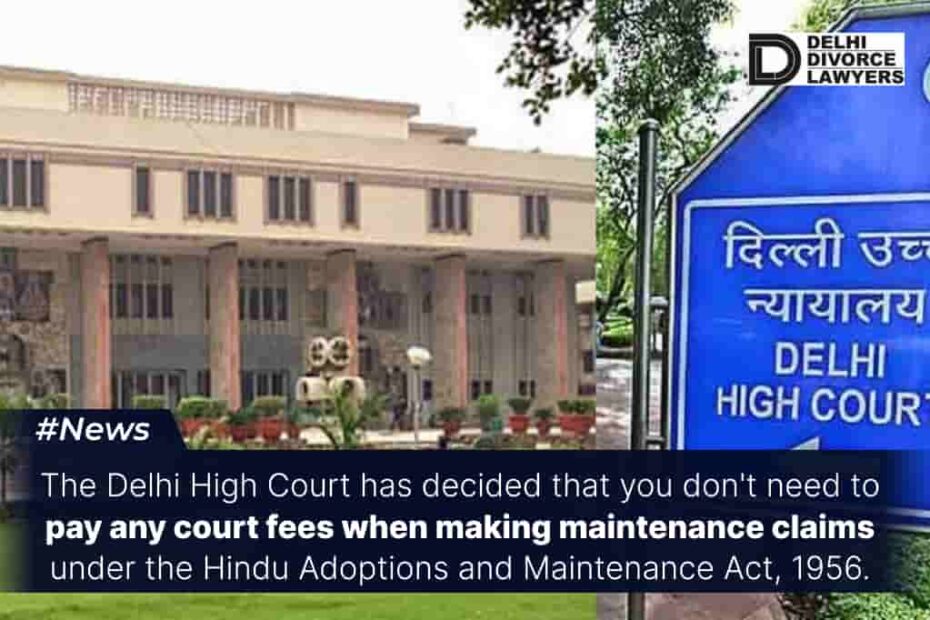“The Family Courts Act, 1984 was enacted pursuant to the 59th Report of the Law Commission wherein it was stressed that in dealing with the disputes concerning the family, the family court should adopt an approach radically different from that adopted in ordinary civil proceedings.”
The Delhi High Court made an important decision about court fees in cases where people seek maintenance under the Hindu Adoptions and Maintenance Act, 1956 (HAMA). This case was about challenging a previous order from the Family Court in February 2020, which required payment of court fees based on the amount claimed. Judges Justice Sanjeev Sachdeva and Justice Vikas Mahajan oversaw this case.
The main issue was whether court fees, which are usually based on the amount claimed, should be applied to maintenance claims under Sections 18 and 20 of HAMA. The people appealing the case, including the spouse of the other person (Appellant 1) and their children (Appellant 2), had started legal proceedings using these sections of HAMA.
The Delhi High Court decided that the cases under Sections 18 and 20 of HAMA shouldn\’t be treated as normal lawsuits. Instead, they are unique legal actions, and the usual court fees based on the claimed amount shouldn\’t be used. This decision reversed the earlier order from February 2020, which required these fees.
The Court emphasized that Family Courts, set up by the State Government, have authority over a wide range of maintenance matters, including those under HAMA, the Hindu Marriage Act, 1955, the Criminal Procedure Code, 1973, and related laws. This case started in a Family Court, and it was stressed that a Hindu wife can claim maintenance under various sections of different legal frameworks.
The Court also talked about the unfairness of having different fee structures for maintenance claims based on the specific laws used. So, a single, consistent approach to court fees was seen as necessary. The Court mentioned past cases like \”Mamta v. Hari Kishan\” and \”Balwinder Singh v. Sinderpal Kaur,\” which had already said that Family Court proceedings aren\’t like regular lawsuits, and ad valorem court fees shouldn\’t be applied.
In conclusion, the Delhi High Court decided that the Family Court had misunderstood the rules, and earlier legal decisions should be followed. As a result, maintenance cases under HAMA were exempted from the usual ad valorem court fees, ensuring a fair and consistent way of handling court fees in maintenance claims.
The Court opined that “in Mamta case (supra) and Balwinder Singh case (supra) the ratio is that the object of the Family Courts Act, 1984 was to set up a forum for settlement of family disputes with due emphasis on conciliation and achieving socially desirable results and further to eliminate the rigid rules of procedure and evidence.”
The Court\’s determination emanated from the promulgation of the Family Courts Act, 1984 (\’the FC Act\’), which was enacted in response to the recommendations delineated in the 59th Report of the Law Commission. The primary objective underlying the FC Act was the simplification of rules and procedures within the realm of family law, with a view to augmenting the operational efficiency of Family Courts.
In alignment with this legal perspective, the Court invoked judicial precedents, including cases such as Karbhari Vithoba v. Anusuya Karbhari (1956 SCC OnLine Bom 97) and Srikant Chand v. Mt. Ram Mohini (1957 SCC OnLine Pat 234). The Court, in the exercise of its juridical wisdom, concluded that proceedings regulated by Sections 18 and 20 of the Hindu Adoption and Maintenance Act (HAMA) should not be categorized as conventional suits. Instead, they should be deemed sui generis legal actions to which a fixed court fee of Re. 1.25p is applicable, thereby exempting them from the conventional ad valorem court fee assessment.
In consequence, the Court, exercising its authority as an adjudicating body, annulled the order issued on 22-02-2020.

